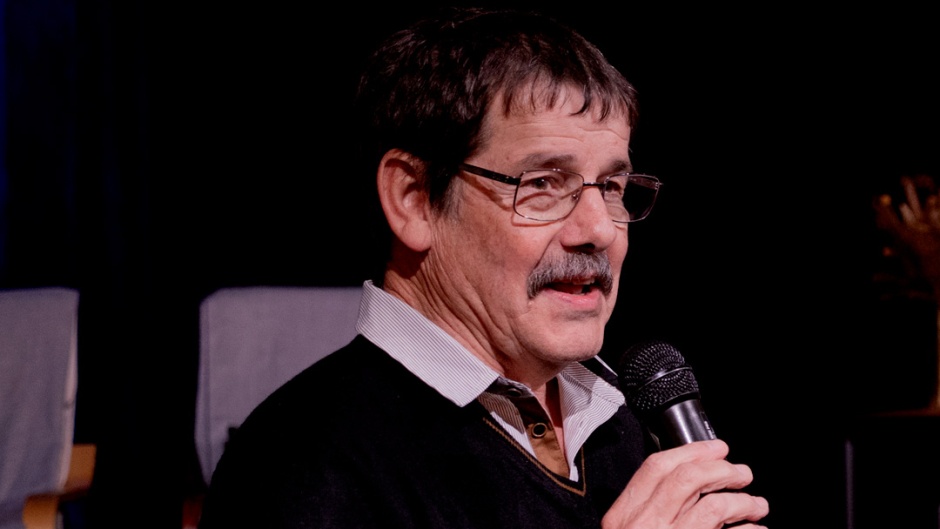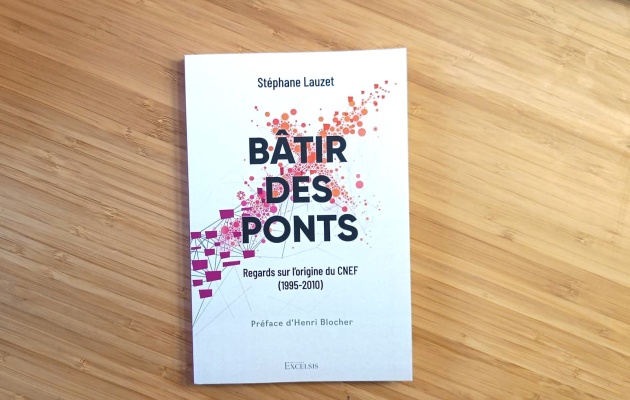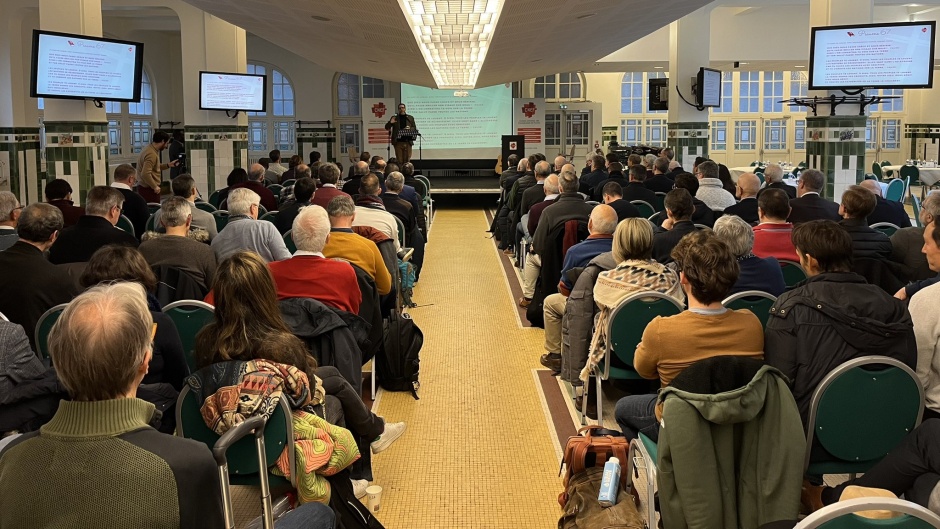In a straightforward style, Stéphane Lauzet describes the steps different streams of evangelicalism in France did to create the National Council of Evangelical Christians. “They put aside their preconceptions and recognised their common faith”.
 Stéphane Lauzet, one of the first leaders of the CNEF in 2010, tells the story of the formation of the evangelical body in France in a new book.
Stéphane Lauzet, one of the first leaders of the CNEF in 2010, tells the story of the formation of the evangelical body in France in a new book.
The case of evangelical Christians in France has often been followed as a case of fast-growing churches in Europe.
From 50,000 evangelicals in in 1950, this religious minority has grown by 15 in the last decades, to 745,000 people today.
French evangelical Protestants have also one of the most visible entities in society, the National Council of Evangelicals in France (CNEF), which in only 15 years as managed to get the support of more than 2,000 churches and Christian organisations.
The CNEF’s emphasis on an impulse of the gospel all regions of the country and a willingness to positively engage in the main socio-political debates of society has made the body a respected voice.
Now, a pastor who has heavily involved in the efforts leading to forming this representative body, has published a book telling the process that let to start the CNEF in 2010.
“New generations of Christians can be inspired by the example of others in their country before them”, Stéphane Lauzet told Evangelical Focus in the interview below.
Iin his book Batir des Ponts (Excelsis, 2024), Lauzet narrates the road of fifteen years that slowly brought together the evangelical Protestant movement in France.

[photo_footer] A copy of the book Batir des Ponts, by Stéphane Lauzet. / Photo: EF [/photo_footer] Question. The book is short (130 pages) but it contains a lot of details, data and stories about how the CNEF came to be. It’s not an academic book, but it seems very didactic. Who do you hope to reach with this document?
Answer. This book has been written so that the memory of the road travelled and the commitment of these church leaders and paraecclesiastical organizations, who dared to take steps towards each other to recognize their common faith and find their common denominator, is not lost.
It’s important for new generations to know where they come from, and to be inspired by the example of those who have gone before them. Besides, I have the weakness to think that this story can be an encouragement to some.
Q. Over half the book is a look back to understand how the CNEF was finally created in 2010. What were the key elements that defined the conversations leading up to that final agreement of French’s evangelicals?
A. First of all, there was the desire not to perpetuate the tensions that existed between the two major bodies of evangelical Protestantism, the Alliance Evangélique and the Fédération Evangélique de France. This led to mutual requests for forgiveness. The leaders realised that this could not go on, that they had to turn the page on the differences that these two organizations had had, and work to bring evangelical Protestantism together, accepting that we can have different opinions on secondary points, while agreeing on the essentials.
[destacate] “There was a growing awareness of the fragmentation in France and the counter-witness effect this was having”[/destacate]There was also a growing awareness of the fragmentation in France (over 50 denominations and nearly 300 independent churches) and the counter-witness effect this was having. In one of his books, John Stott speaks of an almost pathological tendency for evangelicals to fragment, and that’s the situation we had in France.The government’s policy of combating “sectarian movements” was also important, leading many to seek an organization capable of representing and defending them.
Then, there was the example of what was happening in other countries, where evangelical Christians, despite their diversity, came together under the umbrella of a national Evangelical Alliance.
And so, from 2000 onwards, we embarked on a long process that led representatives of evangelical churches and works to meet, talk, question and listen to each other, pray together, discover each other, ask for forgiveness and move towards the creation of the CNEF, based on a common confession of faith and becoming the representative body of evangelicals in France.
In short, it’s the work of men and women who let themselves be used by God.
Q. Today, the CNEF is a lively entity, active in many areas, which gives the impression of being representative of a French evangelical reality that is diverse but united around a biblical faith. From your historical perspective, what strengths do you see in today’s CNEF, 15 years after its creation?
A. One of the major advances is that the CNEF really does draw on the majority of evangelical Protestant denominations, and has brought together almost 70% of evangelical Protestants, giving them a visibility and readability they didn’t have before. It is therefore completely legitimate in its actions.
[destacate] “The CNEF really does draw on the majority of evangelical Protestant denominations, and has brought together almost 70%”[/destacate]This facilitates interaction between its various components, to better work together for the progress of the Gospel in our country. Creating the CNEF clarified the landscape, and this means that other institutions now have a clearly identified interlocutor.
This is undoubtedly an important asset in our society. No longer a nebulous group, evangelicals are recognised as a component of Protestantism that knows how to make its voice heard when necessary. Thanks to the work of its legal, theological and church planting commissions, churches and charities have the tools, landmarks and guidelines they need to navigate this secular France and stay on course.
The 4 verbs that define the CNEF’s objectives today are: connect, inspire, inform, represent.

[photo_footer] A recent gathering of CNEF members. / Photo: CNEF [/photo_footer] Q. What key moment over all these years would explain the identity of what the CNEF is today?
A. The first key element is undoubtedly the restoration of relations between the Alliance Evangélique and the Fédération Evangélique, followed by the desire to combat the fragmentation of the evangelical world in France.
The second element is the change in mentality brought about by the various leaders of the evangelical world. They agreed to look at each other in a different way, to put aside their preconceptions and recognize each other, despite their specificities, as brothers and sisters in Christ.
[destacate] “Asking for forgivenes was a moment of grace, an action of the Spirit, a decisive founding element”[/destacate]In the book, I recount how, on January 6, 2001, the president of the Evangelical Federation publicly asked forgiveness for everything he and the organisation he represented had written and said against Pentecostals and Charismatics, and how, 6 months later, the representative of the Assemblies of God and the Full Gospel Churches in turn took the same step. A moment of grace, an action of the Spirit, a decisive founding element.
The third, equally decisive element was the decision by the Alliance Évangélique Française to step aside and be absorbed by the CNEF, while the Fédération Évangélique, in a different way, took a similar step. Both organisations transferred their missions to the CNEF. This enabled the CNEF to develop into a genuine evangelical alliance, representative of France’s evangelical diversity and a member of the European and World Evangelical Alliance.
Stéphane Lauzet (Lyon, 1953) studied at the Seminary of Evangelical Theology of Vaux sur Seine and then exercised a pastoral ministry for twenty years within the Union of Free Evangelical Churches of France. His ministry is centered around evangelism and pastoral care.
In 1995, he became general secretary of the French Evangelical Alliance (AEF) and in that capacity played an active role in establishing the National Council of Evangelicals of France (CNEF). In 2010, he transitioned to become co-director of the CNEF. He is a member of the Board of SEL and of Micah Challenge France. He also serves on the Board of the John Calvin Seminary of Protestant Evangelical Theology in Aix en Provence. He is a member of the steering committee RESAM, a network providing counsel and support for those involved in Christian ministry and of the French Lausanne Movement group. Since 2011, he devouts part of his time to developing relationships and evangelical testimony in the French-speaking world, as the World Evangelical Alliance's Francophone Ambassador .
[analysis]
[title]One more year[/title]
[photo][/photo]
[text]At Evangelical Focus, we have a sustainability challenge ahead. We invite you to join those across Europe and beyond who are committed with our mission. Together, we will ensure the continuity of Evangelical Focus and Protestante Digital (Spanish) in 2024.
Learn all about our #OneMoreYearEF campaign here (English).
[/text][/analysis]

Las opiniones vertidas por nuestros colaboradores se realizan a nivel personal, pudiendo coincidir o no con la postura de la dirección de Protestante Digital.
Si quieres comentar o